Of the many grindcore, hardcore and punk bands that pass through the world, very few have any staying power. Their music, in simplifying itself, also lost any form of uniqueness not in the hipster sense of accessorizing and randomization, but in the sense of a sentence or poem: expressing something that is its own and is both distinctive and relevant. An exception to this random bleaching of meaning is Germany’s Blood, who have pumped out quality material for years without particularly caring that they weren’t on the cover of glossy magazines. Thanks to guitarist Eisen, who kindly granted us not one but two interview sessions, we have the skinny on the unique mix of death metal, grindcore and early black metal that is Blood.
Do you view the music of BLOOD as death metal, grindcore or something else?
It’s a mixture of both: Grindcore and Death Metal. Generally more Death Metal, but almost always very fast with short songs as in the typical Grindcore-vein.
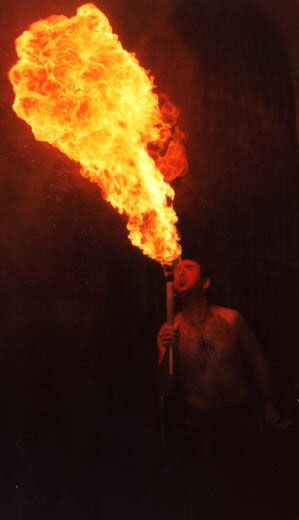 BLOOD lyrics are more like stories, using metaphor, or are insights into psychological and religious topics instead of political topics; why did you take this approach?
BLOOD lyrics are more like stories, using metaphor, or are insights into psychological and religious topics instead of political topics; why did you take this approach?
We have no fixed concept for the lyrics. We write about the things that disturb us. Sometimes also political things, but mostly horrible stories, bloodbaths, less serious things – also against god and stupid religions.
BLOOD lyrics portray a world where physical power and ancient psychic motivations prevail over civility and finance; this is a lot like horror movies, where supernatural forces defeat technology and law enforcement. What do you hope to communicate to the audience this way, and is designed to get past some of their expectations?
We have NO special message for the people – we only want to shout out what’s our meaning about those themes. Lyrics have to fit to the music, so you won’t get lovestories from Blood.
Your music sometimes seems to rest at an intersection of genres, being in song form like thrash or grindcore but in topic and riff style more like a death metal band with black metal overtones (like Hellhammer). What were your influences, and how did you reach this unusual style?
We were always into oldschool Death/Grind. Bands like Death, Exodus, Hellhammer, Possessed, Messiah, Napalm Death, later Impetigo, Morbid Angel, Unleashed, Terrorizer and thousands of others influenced us. That’s the music we are into and that’s the music for what our heart beats, so this is the music for which Blood stands!
Do you think it is easier or harder to write short songs than long songs?
It’s much easier to write shorter songs, especially when you are older than 40 *laughing* – no: It mostly bored me to listen to very long songs, so we prefer shorter ones with a clear and easy structure… right in your face!
You recorded your first demo in 1987. The world has changed a lot since then. Has the BLOOD vision changed? Has it needed to, or is the same process going on that was happening then, in the world?
We recorded our first demos back in 1986. From the very beginning the underlying concept of Blood never changed. We were always strongly rooted in the underground and never wanted to be “big.” Only we have learned how to use our instruments much more over the years.
For a band that is as blunt and confrontational as BLOOD is, there is a lot of subtlety in your lyrics and the way your songs are structured. How do people respond to this? Do they “get it”?
Do you think so? Well – we think a lot about our lyrics. We don’t wanna use the same stories again and again, but the major thing is our music. I think people love us or people hate us for what we do. There is not much between those two poles. We are very pleased with this situation.
By the data to date, there is only one animal in the Galaxy dangerous to man–man himself. So he must supply his own indispensable competition. He has no enemy to help him.
Any priest or shaman must be presumed guilty until proved innocent.
If it can’t be expressed in figures, it is not science; it is opinion.
A “pacifist male” is a contradiction in terms. Most self-described “pacifists” are not pacific; they simply assume false colors. When the wind changes, they hoist the Jolly Roger.
History does not record anywhere at any time a religion that has any rational basis. Religion is a crutch for people not strong enough to stand up to the unknown without help. But, like dandruff, most people do have a religion and spend time and money on it and seem to derive considerable pleasure from fiddling with it.
Of all the strange “crimes” that human beings have legislated out of nothing, “blasphemy” is the most amazing–with “obscenity” and “indecent exposure” fighting it out for second and third place.
Throughout history, poverty is the normal condition of man. Advances which permit this norm to be exceeded–here and there, now and then–are the work of an extremely small minority, frequently despised, often condemned, and almost always opposed by all right-thinking people. Whenever this tiny minority is kept from creating, or (as sometimes happens) is driven out of a society, the people then slip back into abject poverty. This is known as “bad luck.”
– Robert Heinlein, Time Enough For Love (Notebooks of Lazarus Long)
When you write songs, do you start with a concept, or a riff, or something else?
Mostly we start with a cool riff, or a drum-section, than we are jamming around for a while and test different rhythms and riffings. If a song isn’t ready in a short time, it’s usually shit and we throw it away. The lyrics will always follow after the song is ready.
When Hellhammer said, “Only Death is Real,” it launched legions of death metal and grindcore bands who showed us through sickness, misery and sudden doom (in their lyrics) that life is short, manipulations are false, and we need to get back to reality. Only DEAD INFECTION and BLOOD seem to do it by writing short stories and setting them to music, as if trying to show people a state of mind, and not the conclusions of their thoughts. Why do you think you both arrived at this method?
Hmm – do you think so? We try to let a lyric stand for itself… not as a small part of a “big” thing. I don’t like concept-records, nor do the others in Blood. Only in “Gas Flames Bones” we went a bit in that direction. I can’t say that much about DEAD INFECTION’s lyrics only that they are very cool persons and their music fucking rules!
Your music is very consistent, but the ability to make it keeps improving. Do you think bands need to change? Is it possible for bands to change both outward (style) and inward (content) without outward/inward influencing each other?
Yes – we stand for the same style over those many years. NO Band really needs a change, but most bands who try to change their style became crap. It looks like a band is totally fake and false if they play a different style holding the same bandname. A good example how a style change works is Malignant Tumour. They found a way to get their own sound, the lack of which was their problem in the early years. I really love their actualized stuff.
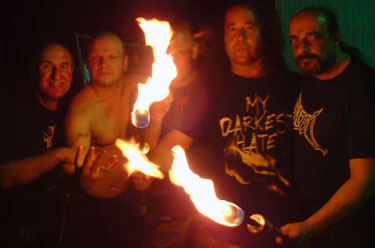
Is there a relationship between how an artist sees the world, and the type of music he or she will then make? Do people who see the world in similar ways make similar music?
No. I think both things are totally different from each other. Lyrics could be in the same way, but the sound/style could be absolutely different.
Grindcore seems to be composed of both metal music and punk music, just more extreme. What do you think grindcore inherited from punk, and what did it inherit from metal?
Grindcore is not the same as grindcore – there are many different shades. From Punk grindcore gets the short songs and mostly the lyrics and the attitude. From Death Metal it gets its brutality and also a part of its lyrics (for the Goregrind corner).
Is VENTILATOR’s name a joke about the name of the drummer from Kreator? (sorry, had to ask)
Ventor? No way. He’s called Ventilator because he rotates as fast with his sticks as the blades of a fan/ventilator.
BLOOD’s work and image has consistently assaulted Christianity, while most grindcore bands are political and most death/black metal bands are about gore, or take a “satanic” approach. Why do you take this approach, and what are you hoping to change in the minds of your fans?
We are no Satanists, so why pray the book of Satan? But we are totally against the manipulations of the church. A free human who stands in life only needs his own mind to know what is good for him, and what he prefers in life. So why not write lyrics about this theme? We hope to change nothing in the minds of our fans, ‘coz our fans are not religious!
BLOOD has released great CDs for almost 20 years, but is less well-known in USA than TERRORIZER, REPULSION, NAPALM DEATH, etc. yet, American fans respond positively to BLOOD when it is played on the radio. The only other early band slighted this much is CARBONIZED. How are these great works overlooked? Is it a cultural difference (American culture, such as it is) in what is expected from bands?
No! It’s because we never wanted to be big. We never wanted to play big tours or lick anyone’s ass. We have great fans in the USA, but bad distribution of our records.
A self does not amount to much, but no self is an island; each exists in a fabric of relations that is now more complex and mobile than ever before. Young or old, man or woman, rich or poor, a person is always located at “nodal points” of specific communication circuits, however tiny these may be. Or better: one is always located at a post through which various kinds of messages pass. No one, not even the least privileged among us, is ever entirely powerless over the messages that traverse and position him at the post of sender, addressee, or referent. One’s mobility in relation to these language game effects (language games, of course, are what this is all about) is tolerable, at least within certain limits (and the limits are vague); it is even solicited by regulatory mechanisms, and in particular by the self-adjustments the system undertakes in order to improve its performance. It may even be said that the system can and must encourage such movement to the extent that it combats its own entropy, the novelty of an unexpected “move,” with its correlative displacement of a partner or group of partners, can supply the system with that increased performativity it forever demands and consumes.
– The Postmodern Condition: A Report on Knowledge by Jean-Francois Lyotard
What brought about the concept behind the song Sodomize the Weak?
It’s a song inspired by Leatherface and the Texas Chainsaw Massacre mixed with my own pervert ideas back in 1993, so it seems to be a bit funny and not that serious at all.
Do you think that people use categories like genre names (black metal, death metal) to obscure the finer details of experience itself, like saying ‘that experience was bad’ or ‘that experience was good’?”
The whole world is full of categorisation. A person needs this to comparing things. Also I need such categorisation. In the Metal genre many bands coined words to define their style to show others, that they created this style – but most of them are ordinary and fake! In my early days of Metal, there also were different styles, but since I’ve been into metal, I only know good music and bad music in Death Metal, in Black Metal, in Hardcore, in Grindcore, in Rock, in Metal…
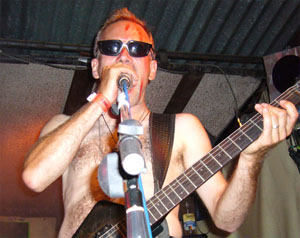 Dysangelium was released in 2003, and in 2007, Impulse to Destroy got re-released. What’s next for BLOOD? Are you going to tour Texas ever?
Dysangelium was released in 2003, and in 2007, Impulse to Destroy got re-released. What’s next for BLOOD? Are you going to tour Texas ever?
Since 2004 our situation has been a bit different. I (Eisen) moved to another city for private reasons. So now we can only rehearse a very few times a year or at the shows. That’s the reason why we have no new songs and it seems that we will not have a new record very soon. Since 2007 we have added another guitar player, maybe he gives the others in Blood some impulses.
When I listen to Blood, I feel like I am watching some action happen, in the same way that bands like Hellhammer or (early) Belial made me think of a movie or opera. You have captured the feeling one gets of watching a drama, in that the music is very visual and sounds like someone experiencing something. How did this come about?
Thanxx for this compliment, but I don’t know how this will appear. We write our kind of music, because it’s deep in our heart and come from the feeling, we get on this music. And also on stage we try to give people more than only playing our songs and that’s it. We try to show them fire, blood and horror!
“Bokanovsky’s Process,” repeated the Director, and the students underlined the words in their little notebooks.
One egg, one embryo, one adult-normality. But a bokanovskified egg will bud, will proliferate, will divide. From eight to ninety-six buds, and every bud will grow into a perfectly formed embryo, and every embryo into a full-sized adult. Making ninety-six human beings grow where only one grew before. Progress.
“Essentially,” the D.H.C. concluded, “bokanovskification consists of a series of arrests of development. We check the normal growth and, paradoxically enough, the egg responds by budding.”
Responds by budding. The pencils were busy.
– Brave New World, Aldous Huxley
Many thanks to Blood for the interview!
Blood homepage
No Comments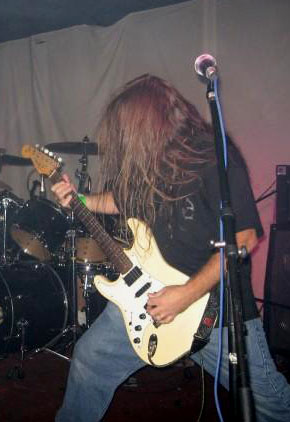 Coya was billed on the flier for this show, but were replaced by Opia, who were already on stage at 9 pm when I arrived. They consisted of a drummer/vocalist and a guitarist. I quite admired this, because it is not easy to get up in front of a mostly empty room to play with such a sparse line up. I’ve also always been impressed with drummers who managed to be a main vocalist. They played solid, minimalist speed metal. After a couple songs, the guitarist took the microphone from the drummer and performed the vocals for the next song. For the following song, they switched instruments completely, with the drummer resuming vocals while taking on guitar duties, and the guitarist taking on the drums. This rare display of musicianship reinforced the raging wall of sound they were producing.
Coya was billed on the flier for this show, but were replaced by Opia, who were already on stage at 9 pm when I arrived. They consisted of a drummer/vocalist and a guitarist. I quite admired this, because it is not easy to get up in front of a mostly empty room to play with such a sparse line up. I’ve also always been impressed with drummers who managed to be a main vocalist. They played solid, minimalist speed metal. After a couple songs, the guitarist took the microphone from the drummer and performed the vocals for the next song. For the following song, they switched instruments completely, with the drummer resuming vocals while taking on guitar duties, and the guitarist taking on the drums. This rare display of musicianship reinforced the raging wall of sound they were producing.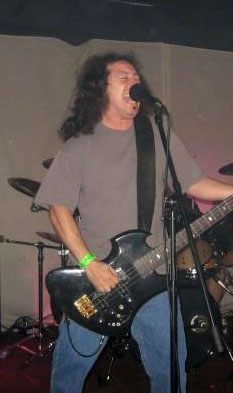 Finally, Insecticide emerged, and all hell broke loose. Playing classic crossover thrash reminiscent of later COC colliding with Dead Brain Cells with Cryptic Slaughter on retainer, Insecticide incited the crowd into a frenzy. The crowd changed completely in the 15 minutes between Temple of Wrath leaving the stage and Insecticide taking it. Although fewer people were present, this was a different audience that was left over, a more deliberate and experienced cross-section of the metal crowd. There was more movement for this band alone than all four preceding bands combined.
Finally, Insecticide emerged, and all hell broke loose. Playing classic crossover thrash reminiscent of later COC colliding with Dead Brain Cells with Cryptic Slaughter on retainer, Insecticide incited the crowd into a frenzy. The crowd changed completely in the 15 minutes between Temple of Wrath leaving the stage and Insecticide taking it. Although fewer people were present, this was a different audience that was left over, a more deliberate and experienced cross-section of the metal crowd. There was more movement for this band alone than all four preceding bands combined.













 After a round of alcohol to suppress the academic background noise from that same day, we took the bus to the shit hole of the south of Sweden, Malmö. Once a great cultural market city, today a polarized ghetto, famous for its sky rocketing crime rates and ethnic segregation. Despite the social decay, Malmö has got a fascinating city life and impresses with its architecture, public events, and first class symphony orchestra. Likewise it’s the center of many metal and electronic acts, and tonight it was none other than At the Gates who would enter the stage at Kulturbolaget. A small, compact club greeted us once we stepped in, while the black/thrash metal band Obscurity was playing uninspiring satanic hymns in the old Bathory vein. The monotonous noise melted in with the screams and laughter from the nearby bar, setting me in a state of mind where the outside world seemed to be just another peripherical dream.
After a round of alcohol to suppress the academic background noise from that same day, we took the bus to the shit hole of the south of Sweden, Malmö. Once a great cultural market city, today a polarized ghetto, famous for its sky rocketing crime rates and ethnic segregation. Despite the social decay, Malmö has got a fascinating city life and impresses with its architecture, public events, and first class symphony orchestra. Likewise it’s the center of many metal and electronic acts, and tonight it was none other than At the Gates who would enter the stage at Kulturbolaget. A small, compact club greeted us once we stepped in, while the black/thrash metal band Obscurity was playing uninspiring satanic hymns in the old Bathory vein. The monotonous noise melted in with the screams and laughter from the nearby bar, setting me in a state of mind where the outside world seemed to be just another peripherical dream.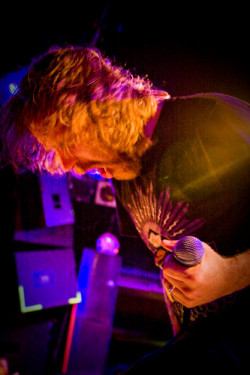
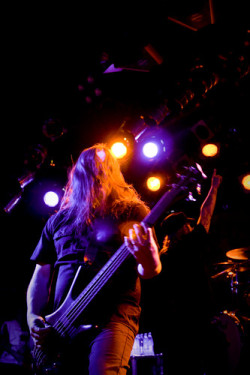 This is the essence of death metal: a rejection of a morally principal approach to life, and the celebration of the raw, physical nature of mankind. The wild, dissonant power chords perfectly layered like a mental journey, backed by the typical death metal percussive rhythms and bridges, launched a macabre symphony together with the painful vocals, and stirred the crowd into unisonal head banging. Few things offer you the experience of feral freedom, like banging your head in rhythm to the sound of death metal, and feeling that the rest of the social world suddenly is reduced to noise. At the Gates provoked us into such a mood through its atonal riff patterns and ascending harmony, proving that they were still masters of the genre. The band was right in avoiding a sell-out by only playing later songs, but naturally, the crowd liked performances like “Under a Serpent Sun” best.
This is the essence of death metal: a rejection of a morally principal approach to life, and the celebration of the raw, physical nature of mankind. The wild, dissonant power chords perfectly layered like a mental journey, backed by the typical death metal percussive rhythms and bridges, launched a macabre symphony together with the painful vocals, and stirred the crowd into unisonal head banging. Few things offer you the experience of feral freedom, like banging your head in rhythm to the sound of death metal, and feeling that the rest of the social world suddenly is reduced to noise. At the Gates provoked us into such a mood through its atonal riff patterns and ascending harmony, proving that they were still masters of the genre. The band was right in avoiding a sell-out by only playing later songs, but naturally, the crowd liked performances like “Under a Serpent Sun” best. The whole performance gave a very respectable, professional and worthy impression, and the band received admirable appreciation from the audience after the finale. When the concert was over, the Gothenburg crowd slowly descended out on the streets, among traffic lights, illegal taxis, and the enormous, clear night sky. The rush of energy, passion and alcohol still boiled in my blood, as I contemplated a new perspective on a band, whose music I’d otherwise reserved to lonely nights when the world had seemed more insane than usual. Death metal, not only as music, but also as an existential passion, was pointing my life in a new direction. Through this concert, At the Gates had proved that Swedish death metal is not a legacy, but an ongoing strife to deal with life intimately and choosing endurance as value in a world reduced to hollow social values. Despite the downfall of the genre and much of its audience, the music continues to emphasize the heavy in life, and the presence of death in our immediate everyday life. “Kingdom Gone” is the scream of mankind out into black space, without response, yet with the certainty that life needs to go on.
The whole performance gave a very respectable, professional and worthy impression, and the band received admirable appreciation from the audience after the finale. When the concert was over, the Gothenburg crowd slowly descended out on the streets, among traffic lights, illegal taxis, and the enormous, clear night sky. The rush of energy, passion and alcohol still boiled in my blood, as I contemplated a new perspective on a band, whose music I’d otherwise reserved to lonely nights when the world had seemed more insane than usual. Death metal, not only as music, but also as an existential passion, was pointing my life in a new direction. Through this concert, At the Gates had proved that Swedish death metal is not a legacy, but an ongoing strife to deal with life intimately and choosing endurance as value in a world reduced to hollow social values. Despite the downfall of the genre and much of its audience, the music continues to emphasize the heavy in life, and the presence of death in our immediate everyday life. “Kingdom Gone” is the scream of mankind out into black space, without response, yet with the certainty that life needs to go on.
 BLOOD lyrics are more like stories, using metaphor, or are insights into psychological and religious topics instead of political topics; why did you take this approach?
BLOOD lyrics are more like stories, using metaphor, or are insights into psychological and religious topics instead of political topics; why did you take this approach?
 Dysangelium was released in 2003, and in 2007, Impulse to Destroy got re-released. What’s next for BLOOD? Are you going to tour Texas ever?
Dysangelium was released in 2003, and in 2007, Impulse to Destroy got re-released. What’s next for BLOOD? Are you going to tour Texas ever?
